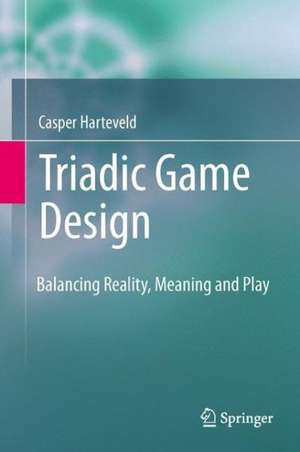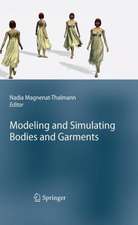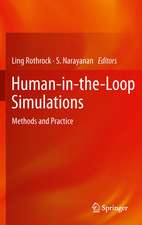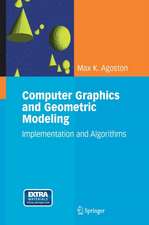Triadic Game Design: Balancing Reality, Meaning and Play
Autor Casper Hartevelden Limba Engleză Paperback – 28 noi 2014
The reader will be introduced to a design philosophy called “Triadic Game Design.”; a theory that all games involve three worlds: the worlds of Reality, Meaning, and Play. Each world is affiliated with aspects. A balance needs to be found within and between the three worlds. Such a balance is difficult to achieve, during the design many tensions will arise, forcing designers to make trade-offs. To deal with these tensions and to ensure that the right decisions are made to create a harmonic game, a frame of reference is needed. This is what Triadic Game Design offers.
| Toate formatele și edițiile | Preț | Express |
|---|---|---|
| Paperback (1) | 909.00 lei 38-44 zile | |
| SPRINGER LONDON – 28 noi 2014 | 909.00 lei 38-44 zile | |
| Hardback (1) | 993.09 lei 6-8 săpt. | |
| SPRINGER LONDON – 3 mar 2011 | 993.09 lei 6-8 săpt. |
Preț: 909.00 lei
Preț vechi: 1136.25 lei
-20% Nou
Puncte Express: 1364
Preț estimativ în valută:
173.99€ • 189.06$ • 146.25£
173.99€ • 189.06$ • 146.25£
Carte tipărită la comandă
Livrare economică 17-23 aprilie
Preluare comenzi: 021 569.72.76
Specificații
ISBN-13: 9781447159230
ISBN-10: 1447159233
Pagini: 336
Ilustrații: XVII, 316 p.
Dimensiuni: 152 x 229 x 18 mm
Greutate: 0.47 kg
Ediția:2011
Editura: SPRINGER LONDON
Colecția Springer
Locul publicării:London, United Kingdom
ISBN-10: 1447159233
Pagini: 336
Ilustrații: XVII, 316 p.
Dimensiuni: 152 x 229 x 18 mm
Greutate: 0.47 kg
Ediția:2011
Editura: SPRINGER LONDON
Colecția Springer
Locul publicării:London, United Kingdom
Public țintă
ResearchCuprins
Press Start.- Foundations.- Reality.- Meaning.- Play.- Balancing.- Game Over?- Notes.- Literature Bibliography.- Game Bibliography.- Solutions.- Workshop.- Worksheets.- Index
Recenzii
From the reviews:
“The book provides a wealth of references from serious games, their entertainment counterparts, and the author’s own game, along with detailed discussions about issues pertaining to the triumvirate of worlds found in TGD. The appendixes offer instructions and resources for a workshop format, which can be used to convey the principles of TGD to developers or potential clients. … Summing Up: Recommended. All levels of game design students, researchers/faculty, and professionals/practitioners.” (A. Chen, Choice, Vol. 48 (11), August, 2011)
“The book provides a wealth of references from serious games, their entertainment counterparts, and the author’s own game, along with detailed discussions about issues pertaining to the triumvirate of worlds found in TGD. The appendixes offer instructions and resources for a workshop format, which can be used to convey the principles of TGD to developers or potential clients. … Summing Up: Recommended. All levels of game design students, researchers/faculty, and professionals/practitioners.” (A. Chen, Choice, Vol. 48 (11), August, 2011)
Notă biografică
Casper Harteveld’s disciplinary background includes: organization science, social and cognitive psychology, and gaming. His scientific expertise covers the design and use of serious games, human-computer interaction and sensemaking. Casper Harteveld’s areas of application include the application of games in soil engineering, and virtual worlds such as Second Life and Active Worlds.
Casper Harteveld holds an MSc in Systems Engineering, Policy Analysis and Management, a BSc in Psychology, and a BSc in Systems Engineering, Policy Analysis and Management.
Casper Harteveld’s professional experience includes working as a game designer on the game Levee Patroller, independently working on a cross-cultural assessment tool at the Capacity Development department for the United Nations Development Programme (UNDP), and working as a research and teaching assistant at the Delft University of Technology.
Casper Harteveld holds an MSc in Systems Engineering, Policy Analysis and Management, a BSc in Psychology, and a BSc in Systems Engineering, Policy Analysis and Management.
Casper Harteveld’s professional experience includes working as a game designer on the game Levee Patroller, independently working on a cross-cultural assessment tool at the Capacity Development department for the United Nations Development Programme (UNDP), and working as a research and teaching assistant at the Delft University of Technology.
Textul de pe ultima copertă
Many designers, policy makers, teachers, and other practitioners are beginning to understand the usefulness of using digital games beyond entertainment. This has led to an increasing number of attempts to apply games meaningfully. Games have been developed from teaching students about history, making patients adhere in taking their medicine, to recruiting personnel for the military and collecting data to improve search engines. Yet, little is known on how to design such games. This book is one of the first to look into the fundamentals of designing any game with a serious purpose and provides a way of thinking on how to design one successfully.
Drawing on the personal design experience of the author as well as dozens of examples, the reader will be introduced to a design philosophy called “Triadic Game Design.” This argues that all games involve three worlds: the worlds of Reality, Meaning, and Play. Each world is affiliated with different people, disciplines, aspects, and criteria. The philosophy also posits that a balance needs to be found within and between the three worlds. Such a balance is difficult to achieve, during the design many tensions will arise, forcing designers to make trade-offs. To deal with these tensions and to ensure that the right decisions are made to create a harmonic game, a frame of reference is needed. This is what Triadic Game Design offers. And this is what makes it an invaluable tool for practitioners and researchers who are interested in using and designing games that have a real world impact.
Drawing on the personal design experience of the author as well as dozens of examples, the reader will be introduced to a design philosophy called “Triadic Game Design.” This argues that all games involve three worlds: the worlds of Reality, Meaning, and Play. Each world is affiliated with different people, disciplines, aspects, and criteria. The philosophy also posits that a balance needs to be found within and between the three worlds. Such a balance is difficult to achieve, during the design many tensions will arise, forcing designers to make trade-offs. To deal with these tensions and to ensure that the right decisions are made to create a harmonic game, a frame of reference is needed. This is what Triadic Game Design offers. And this is what makes it an invaluable tool for practitioners and researchers who are interested in using and designing games that have a real world impact.
Caracteristici
Introduces a design philosophy called "Triadic Game Design' which encompasses the reality, meaning and play of games Analyses the three different perspectives of game design; the game, the pedagogical and real aspects of designing a serious game Offers information on how to design a game An easy to read book, it is accessible to all levels Includes supplementary material: sn.pub/extras








